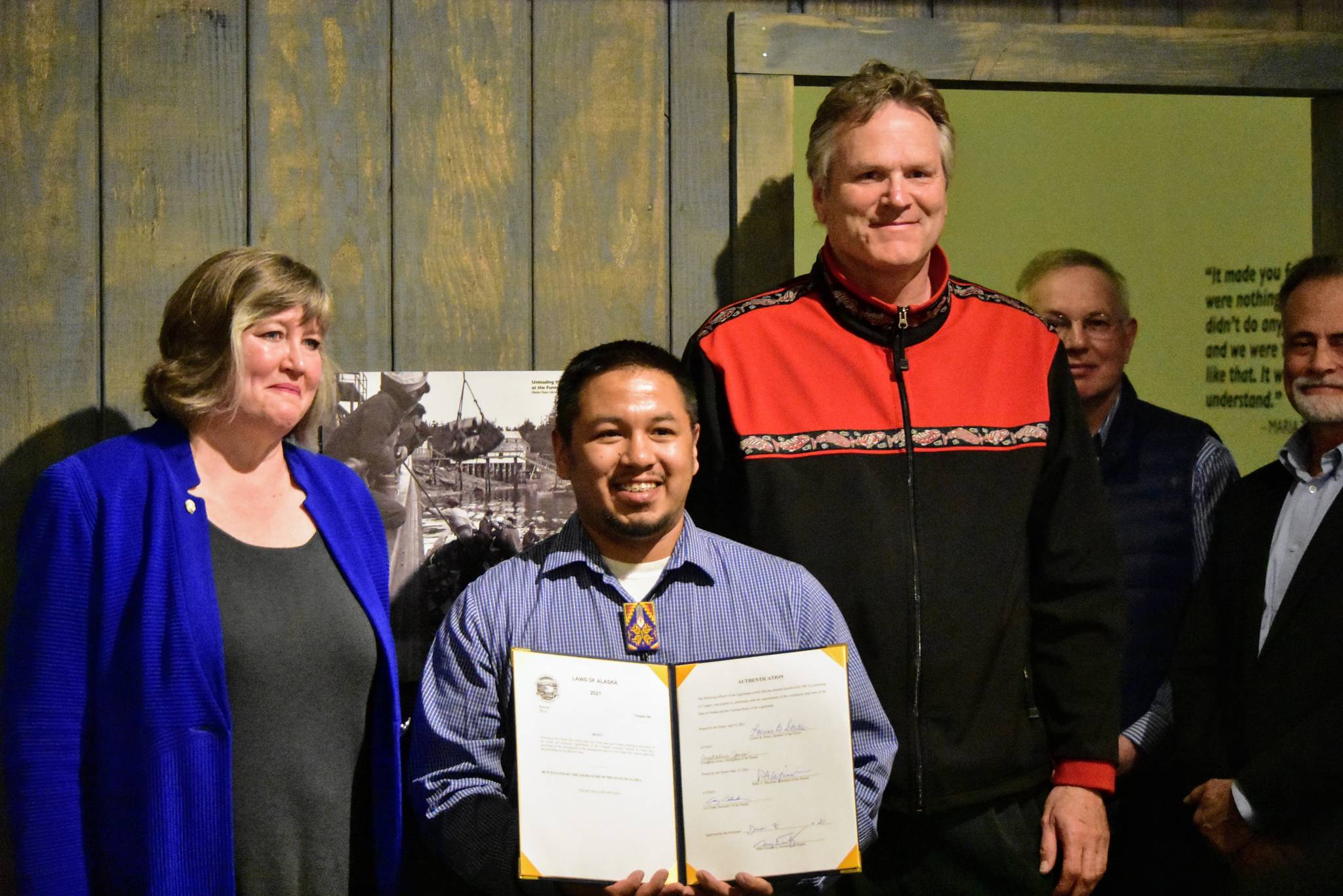A bill aimed at protecting a small Unangax̂ cemetery near Funter Bay was signed into law Tuesday at a ceremony at the Juneau-Douglas City Museum.
Gov. Mike Dunleavy, flanked by state lawmakers and community members, signed the bill in front of a museum exhibit dedicated to the Unangax̂ experience at Funter Bay.
“Across the country, we’ve seen sacred ground disrespected,” said Martin Stepetin Sr., whose grandparents were among those relocated to the site on Admiralty Island. “We don’t want anyone to forget what happened here. We’re still capable of this if we don’t remember what happened.”
Stepetin was active for several years in advocating for a bill protecting the site.
The cemetery is all that’s left of a community of Aleut people forcibly relocated to the area by the federal government during World War II. Citing concerns from the war, federal authorities took residents of St. Paul and St. George on the Pribilof Islands in the Aleutians to a former cannery site on Admiralty Island. The relocated people were left without sufficient supplies in inadequate housing not meant for winter weather.
Speaking at the ceremony, the bill’s sponsor, Rep. Sara Hannan, D-Juneau, said Stepetin was one of the first people to approach her when she was elected to the state House of Representatives.
Hannan said Stepetin had advocated for the bill “with the passion of a descendent of a family who lived that trauma.”
[Retracing the war-torn path to Funter Bay]
Hannan thanked the governor and lawmakers in both bodies for passing the bill, leadership from the House of Representatives and the Senate were present at the signing, too.
“We want their descendants to know it’s not been forgotten,” Dunleavy said at the signing ceremony. “Acknowledging what had occurred goes a long way in closing the gap.”
Though not able to attend the ceremony in person, the event was broadcast through video to communities throughout the state. Representatives from the communities whose people were relocated sent statements praising the bill.
“Thirty-two people, mostly children and elders, died in those internment camps. Given the site’s significance in the history of our state and our country, and its deep meaning to our people and our culture, it is critical to protect the site and ensure that this dark period in our history will never be forgotten,” said Amos Philemonoff, President of the Aleut Community of St. Paul Island, in a statement.
“After being forced from their homes on the Pribilof Islands during World War II, our people were held in overcrowded bunk houses in an old, abandoned cannery a thousand miles from home without clean water, enough food, basic medical care, and other necessities,” Philemonoff continued.
When the bill was passed by the Alaska House of Representatives earlier this year, Rep. Tiffany Zulkosky, D-Bethel, said she viewed preserving the cemetery as an act of reparations for the harm done to the Aleut people. In a speech on the floor of the House in April, Zulkosky said there are villages in the Aleutians that never repopulated following the forced relocation.
[Bill to preserve Unangax̂ Gravesite passes House]
Several Republican lawmakers in the House raised objection to the bill, House Bill 10, during the floor vote, saying the parcel of land being transferred was too large, and could potentially contain valuable resources that could benefit state revenues. Only eight House members voted against the bill, which passed unanimously in the Senate.
“The law represents another step toward addressing the historic wrongs inflicted on our people by acknowledging the lasting impact of the camps,” City of St. George Mayor Patrick Pletnikoff said in a statement. “This signing today represents an important milestone in our ongoing efforts to honor the memory of those who were held at Funter Bay and safeguard their legacy to the Unangax people and to the state of Alaska. We are pleased that, with the passage of this law, the families of those who died in the internment camps at Funter Bay will be able to take care of the graves of their ancestors, and Alaskans will always have access to the site.”
A National Park Service history of the site notes the creation of the cemetery but doesn’t say how many people died or are interred there.
“Soon the need for an Aleut cemetery was grimly acknowledged at Funter Bay, and a small almost-level plot was selected up a protected draw east of the cannery,” the Park Service’s webpage for the site says. “Despite the hardship and death at the Funter Bay camps, the St. Paul and St. George villagers resolutely faced them as they faced hardship and death in the Bering Sea.”
Stepetin said he felt like a weight had been lifted off of him, knowing he no longer had to fight for the site’s protection.
“There will be no logging roads and long live HB10,” he said with excitement.
• Contact reporter Peter Segall at psegall@juneauempire.com. Follow him on Twitter at @SegallJnuEmpire.

